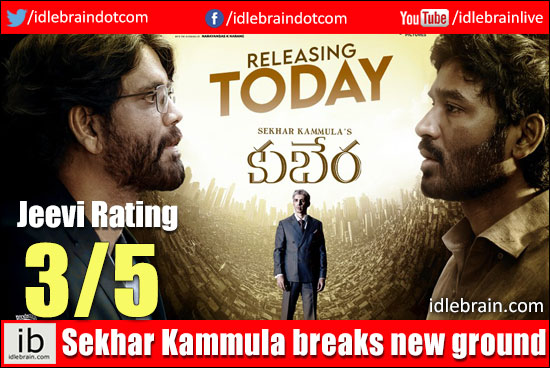|
|
Story
Neeraj (Jim Sarbh), a powerful capitalist in Mumbai, sets his sights on acquiring a lucrative oil reserve. To make it happen, he needs to pay off politicians with a massive bribe of one lakh crores. For this, he enlists the help of Deepak (Nagarjuna), a convict and a former CBI officer. Deepak hatches a scheme to launder the money by creating offshore accounts under the names of unsuspecting beggars.
The plan proceeds smoothly - until one beggar, Deva (Dhanush), catches wind of the conspiracy and manages to escape. What follows is a gripping cat-and-mouse chase between Neeraj, Deepak, and Deva, as each tries to outsmart the other.
Artists Performance
Dhanush: The only star in India who could take on this role and deliver it with complete authenticity is Dhanush. He is incredibly convincing as a beggar, and his transformation - both in appearance and body language - is gradual and seamless as the story unfolds. He carries an underlying innocence and vulnerability throughout, which is vital to the character. It's a highly challenging role to portray believably, and Dhanush executes it with remarkable perfection.
Nagarjuna fits the role of a former CBI officer perfectly, portraying a man who takes up the job out of compulsion. His character has a well-defined arc, and he delivers it with conviction. Rashmika Mandanna’s role is reminiscent of Sridevi’s character in Kshana Kshanam - an ordinary woman who inadvertently gets caught in a criminal web and is compelled to accompany the hero. Jim Sarbh delivers a solid performance as the greedy capitalist. Sayaji Shinde is effective as a principled cop. Nassar and Bhagyaraj appear in brief, single-scene roles. Saurav Khurana stands out with a menacing presence as the antagonist. The other three beggars are well-cast, each chosen from different regions of India. Divya Dekate, who plays the female beggar, has a significant role and delivers a strong performance. Sunaina appears in a brief role as Nagarjuna’s wife.
Story - screenplay - direction: The core of the story revolves around how a beggar reacts when subjected to intense pressure and tempted by money. Chaitanya Pingali co-wrote the story, and director Sekhar Kammula brings his signature style of writing and scene construction to the narrative. He stays true to his sensibilities, avoiding exaggerated hero introductions or over-the-top buildup shots. The protagonists in his films are often idealistic and pure, and even though Dhanush’s character is a beggar, there’s a certain dignity and innocence that shines through. It’s evident that Sekhar has closely observed the lives of beggars, as Deva’s character genuinely makes us pause and reflect on what money means to someone with nothing.
The story follows a mostly linear progression, except for brief glimpses into Deva’s childhood. Sekhar crafts the dynamics among the four main characters with the intricacy of a mafia network. Deepak works for Neeraj, while Deva, unknowingly, is being used by Deepak. Sameera acts as a connecting link between Deva and Deepak. While the central conflict lies between Deva and Neeraj, the emotional and relational dynamics between Deva, Sameera, and Deepak evolve significantly in the second half.
One standout element is the metaphor comparing Deva to an elephant - kind and slow to react initially, but immensely powerful and intelligent when drawn into conflict. There's also a thematic resemblance to Kammula’s Leader, especially in how it deals with political corruption and money laundering.
A spiritual layer is woven into the narrative through the Tirumala episodes, which add a divine undertone. Notably, there are two scenes where the antagonist’s father pledges to donate a diamond-studded crown to Lord Venkateswara - creating a symbolic conflict, since the protagonist hails from Tirupati. Kammula subtly conveys that divine support always aligns with righteousness.
The dialogue, especially the line suggesting that we’re all beggars in one way or another, is thought-provoking. However, a film of this nature would have been more effective with a 2.5-hour runtime. The nearly 3-hour length makes parts of the film feel sluggish, slightly dampening its overall impact.
Other departments: Devi Sri Prasad delivers an exceptional background score that enhances the emotional weight of the film. His song compositions are refreshingly different, and it’s a bit disappointing that the full versions weren’t used in the movie. Except for “Poyiraa Maava,” the other songs weren’t utilized to their full potential - “Pippi Dum Dum” was completely edited out. Poyiraa Maava, however, is a treat for mass audiences.
Niketh Bommi’s cinematography is solid and aligns with Sekhar Kammula’s vision of maintaining a grounded, realistic tone. The scenes involving Dhanush as a beggar, especially those shot in the dump yard, are intentionally raw and unpolished, avoiding any artificial gloss.
Editing by Karthika Srinivasa is competent, while the dialogues, penned by Sekhar Kammula and Chaitanya Pingali, are a standout - rich in sincerity, layered with meaning, and deeply philosophical. Thota Tharani’s production design lends authenticity to every setting, and the film benefits from the lavish production values provided by Sree Venkateswara Cinemas LLP.
Analysis: Sekhar Kammula has always excelled in crafting romance and delivering memorable songs. Most of his previous films, including Leader, were rich in romantic storytelling, and the music often became chartbusters even before the film’s release. However, with this film, he boldly steps out of his comfort zone.
He constructs a compelling conflict where three individuals are drawn into turmoil due to one person’s greed. The characters are well-defined, and the dynamics between them are thoughtfully explored. Dhanush and Nagarjuna deserve praise for setting aside their stardom to fully embrace their roles with authenticity. The producers also deserve credit for placing complete trust in Sekhar Kammula’s vision and backing this story wholeheartedly.
Though Sekhar shifts genres, his sincerity and strength in writing remain consistent. While the film does suffer from slow pacing and occasional narrative inconsistency - a recurring issue in some of his earlier works- if you can overlook that, this is a film worth watching.
|

